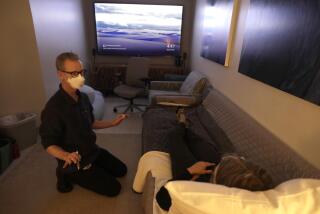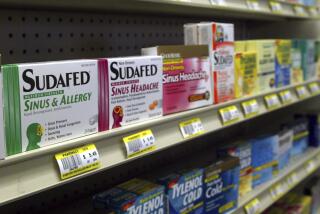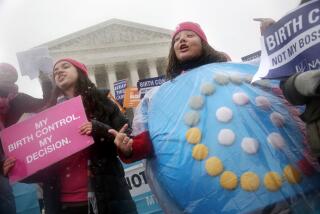FDA Scientist Says All Cox-2 Drugs Pose a Risk
- Share via
WASHINGTON — Patients who take any painkiller in the Cox-2 inhibitor family of drugs will increase their risk of having a heart attack or stroke, in some cases by as much as if they smoked, Food and Drug Administration whistle-blower Dr. David J. Graham told a scientific panel Thursday.
The panel, a combination of two FDA advisory committees, is to vote today on recommendations that could decide the future of the drugs, which include widely used arthritis medications, including Celebrex. Another Cox-2 drug, Vioxx, was taken off the market last year by its manufacturer, Merck & Co.,, after a study showed it could cause cardiovascular problems.
Graham, an epidemiologist in the FDA’s drug safety office, has emerged as the closest thing to a hero in a medical saga that has forced doctors to find alternative treatments for millions of worried patients and threatened billions of dollars in drug company revenue. He told a Senate panel last year that the FDA had failed to pursue early indications of a problem with Vioxx and that his superiors tried to suppress his efforts to warn the medical community.
“I believe, based on the evidence, that there is a Cox-2 effect,” Graham told the panel of about 40 doctors, scientists and other experts Thursday, asserting that the entire class of drugs poses cardiovascular risk. “The bottom line is, there really doesn’t appear to be a need for Cox-2.”
Weighing the risks of Cox-2 drugs against possible benefits is a central question for the panel. Some witnesses have testified that the drugs work no better than painkillers that pose no risk to the heart. But some witnesses and members of the panel have said their own experiences with the drugs have demonstrated significant benefits.
A physician from the National Cancer Institute testified that Cox-2 drugs offer promise in preventing colon cancer.
As the panel began its deliberations Thursday, several members said that although the evidence points to a potential risk for the whole class of drugs, the severity varies among the medications.
If it finds that Cox-2 drugs have benefits, Merck may reconsider its decision to take Vioxx off the market, a company executive suggested.
“If the advisory committee and the FDA conclude that the benefits of this class outweigh the risks in some patient populations, then we would have to consider the implications of these new data given the unique benefits Vioxx offers,” said Peter Kim, president of Merck Research Laboratories.
Graham presented preliminary results from a new study of Medi-Cal patients, which supports other recent research that found risks with Celebrex. He also raised questions about some medicines in a broader family of painkillers called nonsteroidal anti-inflammatory drugs, or NSAIDs.
Of Vioxx, he said there was “no safe level” at which patients could take the drug.
The Medi-Cal study, conducted with Stanford University researcher Dr. Gurkirpal Singh, followed 650,000 patients from 1999 to 2004. It compared patients taking Vioxx with those taking Celebrex, which is still being sold.
The study found that those taking Vioxx were more likely to suffer heart attacks than those taking Celebrex. At doses of up to 200 milligrams a day, the Celebrex patients did not appear to face a higher risk of heart problems than patients who were not on Cox-2 drugs.
But at doses above that, they faced a 24% greater likelihood of heart attacks. Not all current Celebrex users are taking the higher dosages.
Some experts had testified that the risk does not seem to emerge until patients have been using the drugs for a year or more. But Graham said his data suggest that patients can get into trouble immediately. He said studies cited to support the view that risks develop slowly were not broad enough to be conclusive.
Graham said preliminary data from the Medi-Cal study also raise questions about some drugs in the larger category of NSAIDs, which includes Motrin and Aleve.
The results indicated that patients taking the prescription NSAIDs indomethacin, meloxicam and sulindac had higher rates of heart attack. Meloxicam, sold as Mobic, has become a leading substitute for the Cox-2 drugs.
“This is unpublished preliminary data from a study we have not seen. It is impossible to ascertain whether [Graham’s assertions] make any sense without access to the data,” said John Yonsky, a spokesman for Boehringer Ingleheim, the German firm that makes Mobic.
Yonsky said that Mobic has been used by 11 million patients since it was launched in 1996. It entered the U.S. market in 2000. He added that Boehringer monitors adverse reactions and reports them to the FDA.
“We have observed no trends in our post-marketing experience data that would indicate renal or cardiovascular toxicities beyond what is on the label.”
Merck markets indomethacin and sulindac under the brand names Indocin and Clinoril.
“The numbers presented were from an unpublished observational study which we have not had an opportunity to review,” spokeswoman Casey Stavropoulos said.
Graham said he could draw no firm conclusions from the early data, but he urged the scientific panel to recommend that the FDA order broader studies of the risks of NSAIDs.
“I would try to identify the bad actors and get rid of them and identify the ones that appear to be safe and steer the market to them,” he said.
Dr. Alastair J. J. Wood, the chairman of he panel, said the preliminary nature of the Medi-Cal results did not bother members.
“We’re all big boys and girls,” said Wood, a professor at the Vanderbilt University Medical Center. “It would probably be much worse if data popped up later that someone said they had but were prevented from presenting.”
When it votes, the panel could recommend banning the drugs, but it could also recommend restricting their use to certain types of patients or limiting the dose and duration of treatment. The FDA has promised to act on the advice within weeks.
“I see a very clear cardiovascular signal from all of these drugs that is of a substantial magnitude,” Wood said. “That would seem to necessitate some clear action to safeguard patients going forward.”
One possible example of that was described for the panel by Capt. Christopher Grubb, a doctor assigned to the Womack Army Medical Center, which serves Ft. Bragg, N.C.
During a portion of the meeting reserved mainly for witnesses from the public, Grubb described what Celebrex has meant to the Army’s 82nd Airborne Division, saying Cox-2 drugs “are essential in the global war on terrorism.”
He said the Army relies on Celebrex to keep soldiers fighting despite back pain. The military prefers Cox-2 drugs because they do not promote bleeding. Celebrex is one of three drugs in a pack carried by every paratrooper. The others are an antibiotic and Tylenol.
Grubb urged the panel to recommend keeping the drugs on the market. “Without these products, we can’t keep as many soldiers on the battlefield,” he said.





